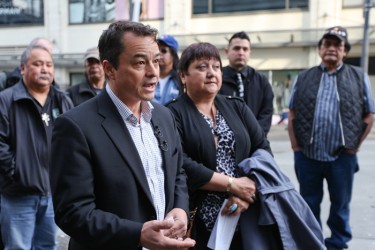Article Origin
Volume
Issue
Year
Nearly 50 years after the collapse of B.C.’s roe herring fishery, five First Nations on the West Coast of Vancouver Island have scored a major court victory after they discovered the federal government was set to end an eight-year closure to the commercial harvest.
On Feb. 21 a federal judge granted five nations of the Nuu-chah-nulth Tribal Council an injunction against re-opening the commercial fishery after an internal memo revealed that Fisheries Minister Gail Shea had gone against the advice of her own ministry’s scientists in her push to open fishing in three regions.
Herring have been off-limits since 2006 because of depleted stocks, and Nuu-chah-nulth long argued against commercial fishing because the population was still too vulnerable.
Shawn Atleo, National Chief of the Assembly of First Nations, attended the court hearing in Vancouver to show his support for the case, and told reporters that herring stocks should continue being protected. He said the injunction is the latest in a long chain of First Nations court victories that have reminded Canada “that our rights are real.”
“First Nations up and down the coast are standing firm in their resolve to see that this commercial harvest not go ahead,” Atleo told Windspeaker outside Vancouver’s federal court.
The controversial document which bolstered the case against the government was penned by the Department of Fisheries and Oceans’ federal herring coordinator and signed by the ministry’s associate deputy ministry.
Minister Shea signed off on the document as well – but added in handwriting: “The minister agrees to an opening at a conservative 10-per-cent harvest rate for the 2014 fishing season.”
It is not the first time a federal Cabinet member has overruled their staff at last moment. In 2009, disgraced international development minister Bev Oda came under fire for cancelling a funding approval for the church aid group Kairos — and was ridiculed in Parliament for ordering the word “not” to be interjected into her department’s recommendation.
Shea’s surprise reversal of the herring ban came on Dec. 23, 2013, and Nuu-chah-nulth launched their lawsuit on Feb. 9.
Tribal Council President Deb Foxcroft applauded Judge Leonard Mandamin’s decision in favour of a continued commercial ban, claiming the minister had refused to discuss her nation’s conservation concerns.
“I don’t understand why she doesn’t understand that ‘no means no,’” Foxcroft said. “We do not want a commercial herring fishery in our traditional territories. She’s not listening to conservation in terms of how the herring affects our salmon and [other] sea life in our traditional territories. She’s totally rejecting that – she’s not listening.”
For Atleo, the case serves as a rebuke to the “unilateral” approach to First Nations territories, and he called on the government to change course towards recognizing tribal self-determination.
“It’s part of a pattern of unilateral decision-making on the part of governments, in this case the Department of Fisheries and Oceans,” Atleo said. “They must respect the rights of the Nuu-chah-nulth, the Haida, and other nations on the West Coast, and listen to what it is we’re saying: Protect the vulnerable stocks of herring. Let them fully recover.
“Our people have been saying this for a long time. We are urging the minister to listen, strongly. We should not have to repeatedly go to the courts.”
In a statement, Foxcroft alleged that Shea’s decision to end the commercial closure reflects a “short-sighted commercial fishing opportunity demanded by the herring industry.”
The five Nuu-chah-nulth nations which launched the court case said they don’t oppose all herring fisheries, but suggested that commercial roe herring could be opened off the coast of Prince Rupert or in the Strait of Georgia, “where herring stocks are abundant.”
The DFO has come under increasing scrutiny in recent months after scientists’ allegations that troves of scientific data relevant to fisheries and waterway protection were being discarded and destroyed as the government shutters fisheries research libraries across the country.
The government says it is preserving the data digitally, but with no public records of what was saved or discarded, a number of researchers have raised alarms over what they likened to book-burnings.
Commercial herring fisheries have long been a source of tension in B.C. After the populations plummeted in the late 1960s, the government instituted a three-year ban starting in 1968. But stocks remained unstable and in 2006 another halt was imposed on the commercial fishery.
- 5812 views

